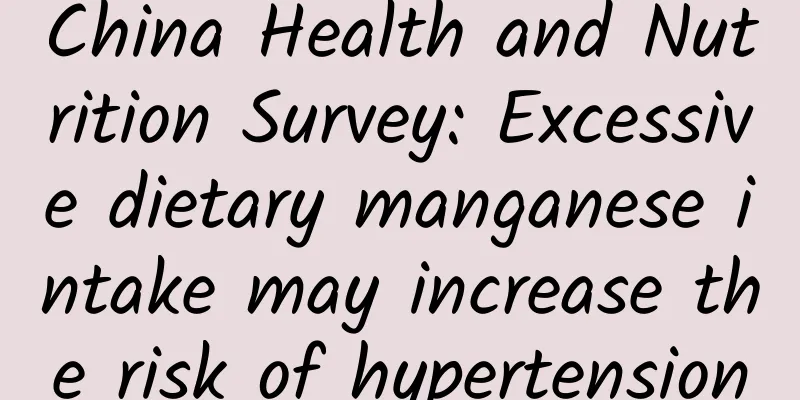China Health and Nutrition Survey: Excessive dietary manganese intake may increase the risk of hypertension

|
Hypertension is one of the major health problems worldwide and a major risk factor for cardiovascular and cerebrovascular diseases and death. Currently, about 1.4 billion adults worldwide suffer from hypertension. The prevalence of hypertension in China is still rising, and the disease burden is significant. Therefore, finding new prevention and control strategies has important public health value. A reasonable diet and a healthy lifestyle are important strategies for preventing and controlling hypertension. In recent years, the role of trace elements in the occurrence of hypertension has received increasing attention. Manganese is an essential trace element for maintaining the balance of the human body. It plays an important role in promoting bone growth and development, maintaining normal glucose metabolism and fat metabolism, and resisting oxidative stress. However, excessive manganese may also lead to the production of oxygen free radicals, thereby destroying mitochondrial function. Previous cross-sectional studies have shown that there may be a link between dietary manganese and blood pressure, but the conclusions are mixed. No study has yet systematically evaluated the prospective association between dietary manganese intake and new-onset hypertension. In order to solve the above clinical problems, the National Kidney Disease Clinical Research Center of Nanfang Hospital conducted relevant research. The results showed that there was a positive correlation between dietary manganese intake and the risk of new hypertension in Chinese adults; when dietary manganese intake was greater than or equal to 6.0 mg/day, the risk of new hypertension increased significantly by 38%. The research results were published in Nutrition, Metabolism & Cardiovascular Diseases. Professor Qin Xianhui of Nanfang Hospital is the corresponding author of this article, and Dr. Zhang Yuanyuan of Nanfang Hospital is the first author of this article. This study is a prospective cohort study based on the China Health and Nutrition Survey (CHNS). A total of 12,177 Chinese adult participants were included. The dietary intake of participants was assessed by 24-hour personal dietary recall and household food inventory weighing for 3 consecutive days, and the cumulative mean of dietary manganese intake was used to represent the long-term exposure level of the participants. Figure 1 Dietary manganese intake is positively correlated with the risk of new-onset hypertension After 6.1 years of follow-up, 4,269 (35.1%) participants developed hypertension. Dietary manganese intake was positively associated with the risk of new-onset hypertension (Figure 1). Compared with participants with a dietary manganese intake of less than 6 mg/day, participants with a dietary manganese intake of 6.0 mg/day or more had a significantly increased risk of hypertension by 38%. Figure 2 10 types of food rich in manganese (Picture from the Internet, copyright belongs to the original author) The study found that maintaining an appropriate dietary manganese intake (less than 6 mg/day) in Chinese adults may reduce their risk of hypertension. As shown in Figure 2, the main food sources of dietary manganese include wheat bran, beans, spinach, black tea, seafood, sesame, pumpkin seeds, hazelnuts, walnuts and dark chocolate. The study suggests that the intake of these foods should be maintained in moderation. However, more research is needed to evaluate whether dietary manganese from different food sources has different effects on the risk of hypertension. References: Zhang Y, Liu M, Yang S, Zhang Y, Ye Z, Wu Q, Li R, Zhou C, He P, Liu C, Jiang J, Liang M, Wang G, Hou FF, Qin X. Positive association between dietary manganese intake and new-onset hypertension: A nationwide cohort study in China. Nutr Metab Cardiovasc Dis. 2024 Mar;34(3):699-705. Editor | Zhang Yuanyuan and Zhang Yiwei Audit | Qin Xianhui Reprint: Please contact us and indicate the source |
Recommend
How much does it cost to do B-ultrasound during pregnancy
How much does it cost to do an ultrasound to chec...
How many weeks of pregnancy will the belly button bulge
After a woman becomes pregnant, as the fetus grad...
Can I eat millet porridge during menstruation?
Millet is actually rich in a lot of vitamins. In ...
4 healthy teas to effectively treat scanty menstruation
Small menstrual volume (oligomenorrhea) The menst...
What are the simplest and most effective ways to remove spots?
Many people will be jealous when seeing those wom...
Pregnant woman smelled mothballs for five months
We women are very concerned about our own image. ...
Treatment of infertility caused by chronic cervicitis
Chronic cervicitis is the most common gynecologic...
Symptoms of Overactive Bladder in Women
I have bladder hyperactivity syndrome. If I treat...
Is the injection of oxytocin more painful than natural childbirth?
Oxytocin injection is a common drug in medicine. ...
Can I eat water chestnuts during menstruation?
Maybe most of us are not familiar with water ches...
Clinical manifestations of menopausal syndrome
We also call menopausal syndrome menopausal syndr...
How long will it take to die from bleeding?
Important reminder: Hemorrhage is multi-function ...
Can I eat watermelon if I have a threatened miscarriage?
Many women are happy and excited after becoming p...
Why can't I get pregnant during ovulation?
Under normal circumstances, having sex during ovu...
Is it possible to get pregnant if you have sex one week after your period?
We know that there is an appropriate time for men...









